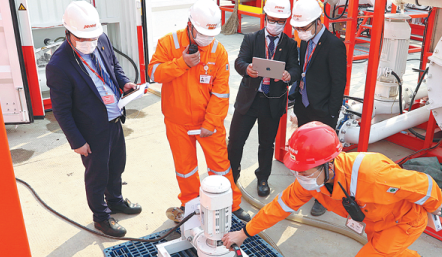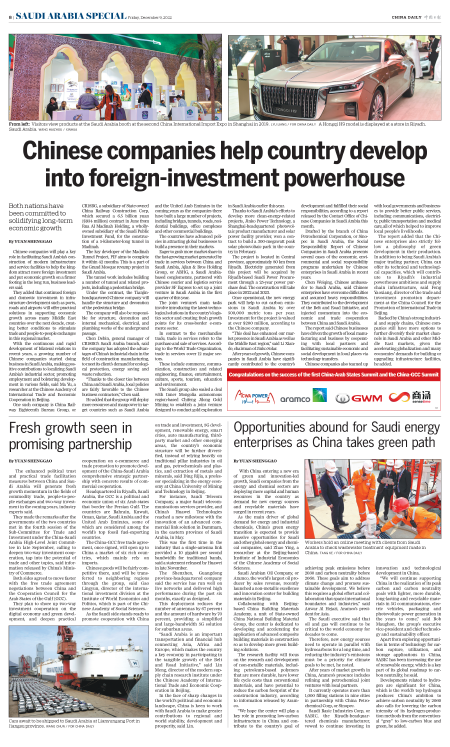
Workers hold an online meeting with clients from Saudi Arabia to check wastewater treatment equipment made in China.
With China entering a new era of green and innovation-led growth, Saudi companies from the energy and chemical sectors are deploying more capital and human resources in the country as demand for new energy sources and recyclable materials have surged in recent years.
As the main driver of global demand for energy and industrial chemicals, China's green energy transition is expected to provide massive opportunities for Saudi and other global energy and chemical companies, said Zhao Ying, a researcher at the Beijing-based Institute of Industrial Economics of the Chinese Academy of Social Sciences.
Saudi Arabian Oil Company, or Aramco, the world's largest oil producer by sales revenue, recently launched a non-metallic excellence and innovation center for building materials in Beijing.
Collaborating with Beijing-based China Building Materials Academy, a unit of State-owned China National Building Material Group, the center is dedicated to developing and accelerating the application of advanced composite building materials in construction so as to develop more green building solutions.
The research facility will focus on the research and development of non-metallic materials, including petroleum-based polymers that are more durable, have lower life cycle costs than conventional materials, and have potential to reduce the carbon footprint of the construction industry, according to information released by Aramco.
"We hope the center will play a key role in promoting low-carbon infrastructure in China and contribute to the country's goal of achieving peak emissions before 2030 and carbon neutrality before 2060. These goals aim to address climate change and promote sustainable development. We believe this requires a global effort and collaboration that spans international boundaries and industries," said Anwar Al Hejazi, Aramco's president for Asia.
The Saudi executive said that oil and gas will continue to be critical to the world economy for decades to come.
Therefore, new energy sources need to operate in parallel with hydrocarbons for a long time, and reducing the industry's emissions must be a priority for climate goals to be met, he noted.
After years of market growth in China, Aramco's presence includes refining and petrochemical joint ventures with local partners.
It currently operates more than 1,000 filling stations in nine cities in partnership with China Petrochemical Corp, or Sinopec.
Saudi Basic Industries Corp, or SABIC, the Riyadh-headquartered chemicals manufacturer, vowed to continue investing in innovation and technological development in China.
"We will continue supporting China in the realization of its peak carbon and carbon neutrality goals with lighter, more durable, long-lasting and recyclable materials in 5G communications, electric vehicles, packaging and photovoltaic power generation in the years to come," said Bob Maughon, the group's executive vice-president and chief technology and sustainability officer.
Apart from exploring opportunities in terms of technology for carbon capture, utilization, and storage applications in China, SABIC has been increasing the use of renewable energy, which is a key part of its global roadmap to carbon neutrality, he said.
Developments related to hydrogen are significant for China, which is the world's top hydrogen producer. China's ambition to achieve carbon neutrality by 2060 also calls for lowering the carbon intensity of its hydrogen-production methods from the conventional "grey" to low-carbon blue and green, he added.

